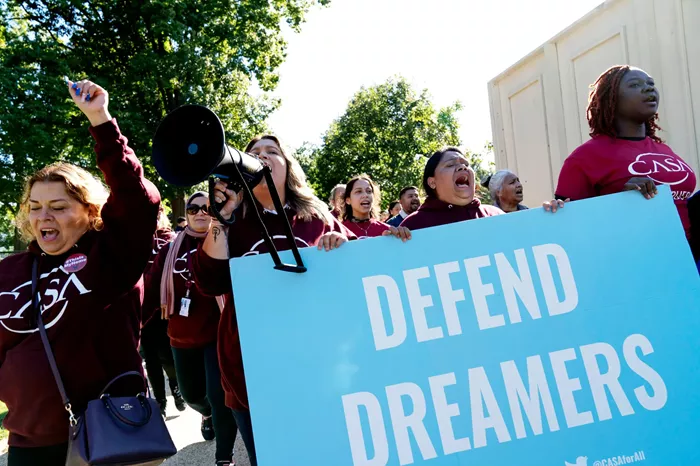DACA Faces Legal Challenge as Appeals Court Reviews Program.
The Deferred Action for Childhood Arrivals (DACA) program, which has provided protection to undocumented immigrants who arrived in the United States as children, is now facing significant legal challenges. For over a decade, DACA has allowed these individuals, known as Dreamers, to build careers and raise families without the fear of deportation.
The program was created by former President Barack Obama as a temporary measure, anticipating that Congress would eventually pass comprehensive immigration reform. However, due to ongoing political gridlock, DACA has endured three presidential administrations and has become increasingly vulnerable to legal challenges. Texas and six other Republican-led states have long sought to end the program, and it is now at a critical juncture as it moves through the U.S. Court of Appeals for the Fifth Circuit, widely recognized as the most conservative appellate court in the country.
On Thursday, a three-judge panel of the Fifth Circuit heard arguments regarding a sweeping ruling from a lower court that could eliminate DACA entirely.
The program, which peaked with around 800,000 enrollees, currently protects about 500,000 individuals. It has enabled many Dreamers to secure jobs in various sectors, including technology, education, and healthcare. They have made significant contributions to society, including purchasing homes and paying taxes.
Former President Donald Trump attempted to dismantle DACA in 2017, part of a broader effort to reduce undocumented immigration. Since then, the program has faced a series of court rulings that have resulted in its suspension, reinstatement, and partial rollback. The current challenge originated in 2018 when conservative states filed a lawsuit against the program.
In June of last year, U.S. District Judge Andrew S. Hanen ruled that the Biden administration’s efforts to solidify DACA were insufficient and that the program was illegally enacted. His decision, which is currently on hold pending appeal, would not only affect Texas but could also lead to DACA’s termination nationwide.
During Thursday’s hearing, judges scrutinized the states’ argument that an order to end DACA should be enforced across all states, including those governed by Democrats who argue that DACA benefits their communities. Judge Stephen A. Higginson questioned how one judge could impose such a ruling on other states that support the program, asking, “How does a single judge have that authority?”
Higginson also challenged Texas’s claim that DACA recipients were a financial burden. He highlighted that many Dreamers have lived in the U.S. since childhood and questioned the logic that they would return to countries they do not know if the program ended.
Joseph Mazzara, representing the Texas attorney general, argued that DACA recipients would likely leave the U.S. voluntarily if the program ended. He referenced a survey of DACA recipients conducted by Tom K. Wong, director of the U.S. Immigration Policy Center at the University of California, San Diego. However, Wong disputed Mazzara’s claim, stating that DACA recipients are increasingly determined to stay in the U.S.
Nina Perales, an attorney at the Mexican American Legal Defense and Educational Fund, which represents DACA recipients, argued that the costs Texas cited—such as education and healthcare—are not directly related to DACA. “Any person in Texas, citizen or not, is entitled to the same types of services,” she said.
Following the hearing, Perales expressed satisfaction that the judges engaged deeply with the issues, including whether Texas had the legal standing to sue. The Supreme Court has previously overturned several Fifth Circuit decisions for overstepping on this matter.
In a landmark 8-1 ruling last June, the Supreme Court stated that states do not have the standing to challenge executive immigration priorities, affirming that states cannot use district courts to undermine federal immigration policy. Judge Higginson reiterated this point during the hearing.
However, Judge Jerry Edwin Smith offered a different interpretation, arguing that the Supreme Court’s ruling did not specifically address the current case.
When DACA was first implemented, it offered protections to unauthorized immigrants under 31 who arrived in the U.S. as children and met certain criteria. While it does not provide a path to citizenship, recipients must apply and pay a fee to renew their protections every two years.
Since a Texas judge ruled DACA illegal in mid-2021, only renewals have been accepted, preventing new enrollees. Many current recipients now have U.S.-citizen children. New Jersey Solicitor General Jeremy Feigenbaum emphasized the impact on families, stating, “We’re also talking about 250,000 U.S.-citizen children.”
Outside the courthouse in New Orleans, dozens of DACA beneficiaries and supporters gathered, chanting, “Say it loud, say it clear. Immigrants are welcome here.” Many wore yellow T-shirts proclaiming “Home is here” and carried banners.
Sandra Avalos, a DACA recipient brought to the U.S. from Mexico at age seven, shared her concerns. Working with truant juveniles in Dallas, she relies on DACA to maintain her job and driver’s license. If the program ends, she fears deportation and separation from her U.S.-born son. “A police officer could pull me over, and that could be it,” Avalos said before the hearing. However, after the hearing, she expressed optimism about the program’s future.
Related topics:
- Victim of Illegal Immigrant Released Under Harris’s Program Criticizes Her Resurfaced Speech
- Texas Students from Immigrant Families Missed College Aid Due to FAFSA Error
- Putin Increases Visa-Free Access for Georgians in Russia


